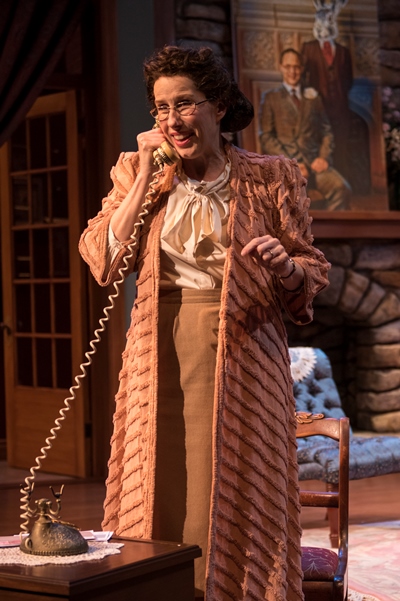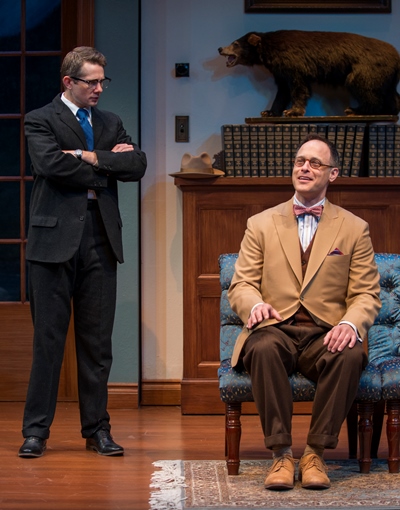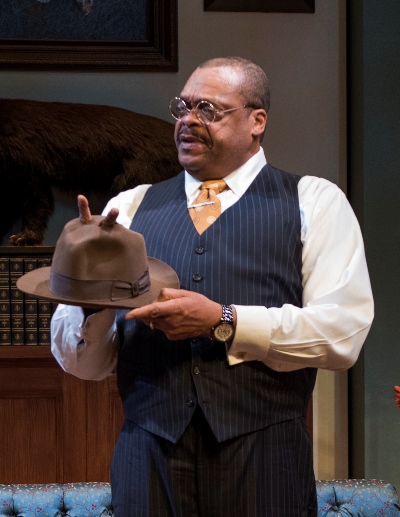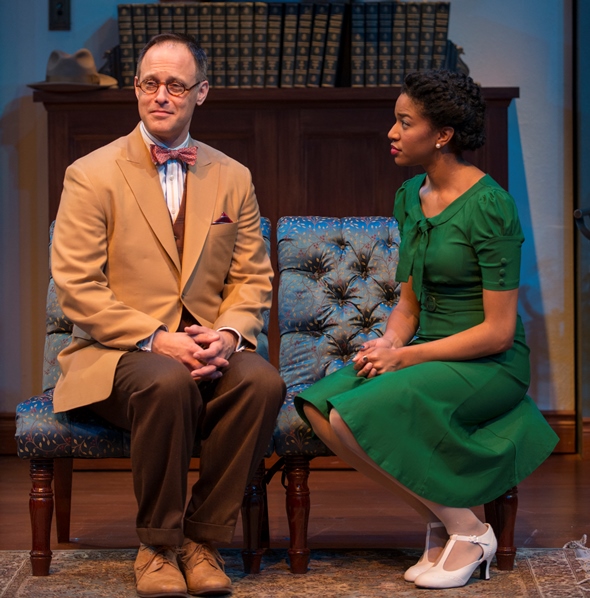‘Harvey’ at Court: In wacky account, message of a good soul, invisible rabbit is plain to see
“Harvey” by Mary Chase, at Court Theatre through June 11. ★★★★★
By Lawrence B. Johnson
In these parlous times, it’s good to remember that Mary Chase’s radiant moral comedy “Harvey” won the 1945 Pulitzer Prize for Drama. As Elwood P. Dowd, the protagonist who pals around with a 6-foot-tall invisible white rabbit, might say: I’d like to see a prize awarded to Court Theatre for its lovely staging of the play.
 If we judge by what we see in the fun house mirror that is the present-day world, “Harvey” might look like a trivial piece of work. Shoot, today it wouldn’t even be written. But in truth, its message – what the world might look like if we didn’t each get our early hate and fear serum – is desperately needed today.
If we judge by what we see in the fun house mirror that is the present-day world, “Harvey” might look like a trivial piece of work. Shoot, today it wouldn’t even be written. But in truth, its message – what the world might look like if we didn’t each get our early hate and fear serum – is desperately needed today.
I’m not speaking figuratively here. The play pivots on just such a moment, when Elwood is about to be cured of his condition, and the kindness and contentment that go with it.
There are two reasons to think Elwood (a luminous turn by Timothy Edward Kane) is simply wacko: the big bunny Harvey that isn’t there, of course; but also his innocent openness, his unfailing spirit of accommodation, his simple conviction that society and everyone in it means him well. Elwood would enjoy a beer with Will Rogers; neither ever met a man he didn’t like.
The comedy – which in the hands of director Devon de Mayo and an intensely serious cast is very funny, indeed – contrasts the implacably mild-mannered Elwood with everyone else in sight, a fraught universe of climbers, fretters and complainers.
To his devoted but socially aspiring sister Veta (a performance of irresistible, all-in physical farce by Karen Janes Woditsch), Elwood is an embarrassment to be kept at bay. He insists on introducing the big rabbit to everyone, including the ladies who come to Veta’s teas. The day finally arrives when Veta feels she has no choice but to place Elwood in psychiatric care, to institutionalize him.
 Which his fine by her teenage daughter Myrtle Mae, who will never be able to have her young friends call so long as that ridiculous unseen bunny prowls the house. Sarah Price brings a welcome jolt of youthful impatience to the role, and with it a keen sense of mordant comedy.
Which his fine by her teenage daughter Myrtle Mae, who will never be able to have her young friends call so long as that ridiculous unseen bunny prowls the house. Sarah Price brings a welcome jolt of youthful impatience to the role, and with it a keen sense of mordant comedy.
But if Veta can’t manage Elwood, mere psychiatrists have no chance at all. In the sweetest way, Kane’s blithe-spirited inductee turns the sanitarium upside-down – staff and all. Erik Hellman is the charming, earnest younger doctor, who’s more than a little distracted by a pretty nurse (the warmly appealing Jennifer Latimore) and completely misreads the signals from Elwood and his sister.
Kudos here to set designer Courtney O’Neill, whose movable walls – and invertible telephones! – allow for quick switches between Veta’s living room and the sanitarium’s reception area.
Enter the boss, psychiatrist-in-chief, in the imposing form of A.C. Smith. This is not a man to be trifled with. Smith cuts an imperious figure who will soon get to the bottom of the off-the-chart craziness that has beset his hospital. But that’s before he catches up with Elwood – did I just give something away? – and Harvey (yea, even the rabbit) in a bar, and has a nice long chat with them. Both. The rest is Smith under full comic sail.
 In the end, reason prevails. That, and hope. What is the expression: our better angels. Elwood marches willingly to his reclamation, his redemption, his conversion to the ruling faith of normalcy. That’s where reason enters in, the uniquely human capacity to see and comprehend, and to honor the impulse of wisdom.
In the end, reason prevails. That, and hope. What is the expression: our better angels. Elwood marches willingly to his reclamation, his redemption, his conversion to the ruling faith of normalcy. That’s where reason enters in, the uniquely human capacity to see and comprehend, and to honor the impulse of wisdom.
“Harvey” is disarming in myriad small and honest ways. That may be said as well of Kane’s portrayal of the gentle man with the large rabbit companion. It’s a performance free of irony or calculation or guile. Asked how he first met Harvey, Elwood recalls an evening when he was walking down the street and a voice called out, “Good evening, Mr. Dowd.” He turned, he says, to see a 6-foot white rabbit leaning against a lamp post. He thought nothing of it because, after all, “when you’ve lived in a town as long as I’ve lived in this one, you get used to the fact that everybody knows your name.”
Kane plays it so straight that it takes a second to realize what he has just said.
Related Link:
- Performance location, dates and times: Details at TheatreinChicago.com
Tags: Court Theatre, Courtney O'Neill, Devon de Mayo, Erik Hellman, Harvey, Jennifer Latimore, Karen Janes Woditsch, Mary Chase, Sarah Price, Timothy Edward Kane


